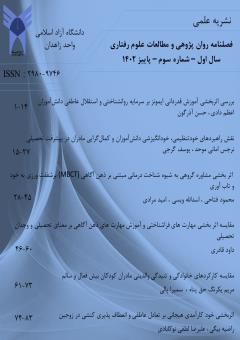اثربخشی خود کارآمدی هیجانی بر تعادل عاطفی و انعطاف پذیری کنشی در زوجین
محورهای موضوعی : روانشناسیراضیه بیگی 1 , علیرضا لطفی نوکابادی 2 *
1 - کارشناسی ارشد مشاوره خانواده، دانشگاه غیر انتفاعی صفاهان، اصفهان، ايران.
2 - دانشجوی دکتری مشاوره، دانشگاه آزاد اسلامی واحد اهواز، اهواز، ايران.
کلید واژه: انعطاف پذیری کنشی, تعادل عاطفی, خود کارآمدی هیجانی.,
چکیده مقاله :
تلاش برای اصلاح انعطاف پذیری کنشی و برقراری تعادل عاطفی، میتواند زندگی زناشویی زوجین را بهبود بخشد که اعمال مداخلات روانشناختی را ضروری میسازد؛ بنابراین پژوهش حاضر با هدف بررسی اثربخشی خود کارآمدی هیجانی بر تعادل عاطفی و انعطاف پذیری کنشی در زوجین، انجام گرفت. روش پژوهش نیمهآزمایشی با طرح پیشآزمون-پسآزمون با گروه کنترل بود. جامعۀ پژوهش را زوجین مراجعه کننده به مراکز مشاوره خانواده شهر اصفهان در نیمه دوم سال 1402 تشکیل دادند که تعداد آنها 1850 نفر بودند. از جامعه مذکور، 30 زوج، به روش هدفمند انتخاب و تصادفی در دو گروه آزمایش و کنترل گمارش شدند. پیشآزمون از طریق مقیاس تعادل عاطفه دینر و همکاران (2010) و پرسشنامه¬ی انعطاف پذیری کنشی کانر و دیویدسون (2003) انجام شد. در مرحله بعد گروه آزمایش تحت 8 جلسه 90 دقیقهای به صورت هفتگی خود کارآمدی هیجانی (مک کی و وست، 2017) قرار گرفتند. گروه کنترل در این مدت در لیست انتظار بود. پس از اتمام جلسات، پسآزمون اجرا شد. دادهها به وسیله تحلیل کواریانس تکمتغیره و چندمتغیره و با استفاده از نسخه22 نرمافزار SPSS تحلیل شدند. نتایج بیانگر این بود که تفاوت میانگین دو گروه در نمرات تعادل عاطفی و انعطاف پذیری کنشی معنادار است (05/0>p). براین اساس متخصصان میتوانند به منظور بهبود تعادل عاطفی و انعطاف پذیری کنشی در زوجین می توان از درمان خود کارآمدی هیجانی بهره ببرند.
Trying to improve the acceptance of action and maintaining the emotional relationship can improve the married life of couples, which makes the application of psychological models. Therefore, the current research was conducted with the aim of investigating the effectiveness of emotional efficiency on emotional self and action comprehensibility in couples. The research method was semi-experimental with a pre-test-post-test design with a control group. The second study was conducted on couples who referred to family counseling centers in Isfahan in the middle of 2023. From the mentioned society, 30 couples were selected in a purposeful way and randomly assigned to two experimental and control groups. The pre-test was done through Diener et al.'s affect balance scale (2010) and Connor and Davidson's action flexibility questionnaire (2003). In the next stage, the experimental group underwent 8 weekly 90-minute emotional self-efficacy sessions. The control group was on the waiting list during this time. After the sessions, the post-test was administered. The data were analyzed by univariate and multivariate covariance analysis using SPSS software version 22. The results showed that the average difference between the two groups in emotional balance and action flexibility scores is significant (p<0.05). Therefore, specialists can benefit from emotional self-efficacy therapy in order to improve emotional balance and action flexibility in couples

